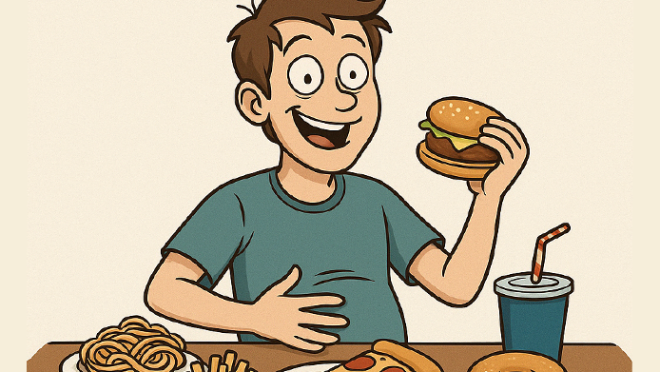Why some people eat a lot but don’t gain weight?
Why some people eat a lot but don’t gain weight?

Some people seem to eat non-stop and never put on weight, while others struggle even after cutting calories and exercising. It can seem unfair, but science offers a few reasons why this happens.
Genetics and metabolism play a big role
Some people are born with a faster metabolism, which means their bodies burn calories more quickly. Others might have genes that help them stay slim without trying. However, nutrition and daily habits matter too — not just biology.
Check for underlying health issues
If you’re underweight even though you eat well, it’s worth checking for health conditions like hyperthyroidism or celiac disease. These can affect how your body processes and absorbs nutrients.
Research
A 2019 study by Cambridge University found that people with more “weight gain” genes tend to become overweight more easily. On the flip side, people who stay slim naturally have fewer of these genes — and sometimes even genes linked to healthy thinness.
But that doesn’t mean genes are everything. Lifestyle habits and hormone levels also affect how our bodies respond to food.
Eat when you’re actually hungry
Cravings and emotional eating can lead to weight gain. Try to eat only when you feel physically hungry, not just because food is around or you’re bored.
Hormones affect appetite
Two key hormones control your hunger: are Leptin (which tells your brain you’re full) and Ghrelin (which increases your appetite)
People who are more sensitive to leptin may find it easier to avoid overeating.
Sleep helps with weight control
Lack of sleep can disrupt hormone levels, increasing hunger. Getting 7 or more hours of sleep each night helps your body manage hunger signals and cravings better.
How you eat matters
Eating slowly and chewing properly gives your brain time to register fullness. Also, sitting down to eat (instead of standing or eating on the go) can help you avoid overeating.
Being thin doesn’t always mean healthy
Just because someone doesn’t gain weight doesn’t mean their body is in good shape. Some thin people still have high body fat and face risks of heart disease or diabetes.
Also, if a person is thin due to poor nutrient absorption, they might develop:
- hormone problems
- weak bones (osteoporosis)
- iron deficiency or anemia
Staying healthy is about more than just body weight — it’s about how your body functions overall.


